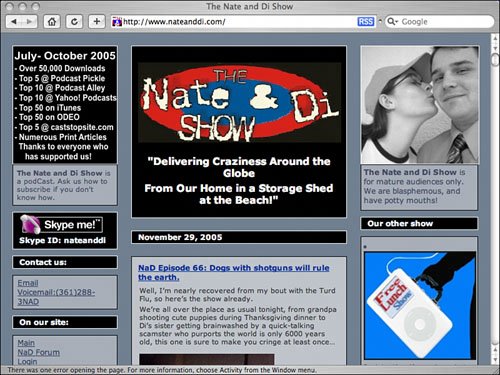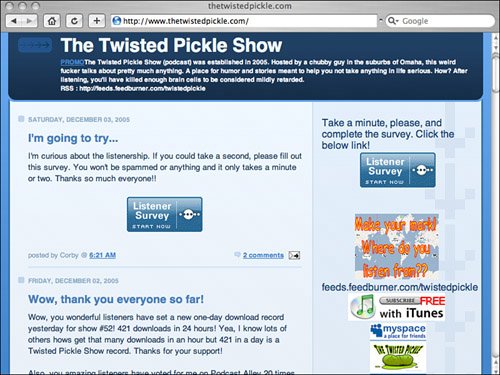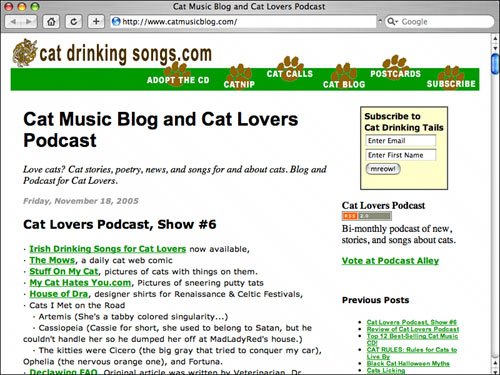Passion Pitfalls
| Don't you hate it when you go home for the holidays and you know that, for whatever reason, you have some secret you have to keep from your family? You don't want your grandmother knowing you're dating someone outside your faith. You don't want your mom to see your tattoo. You, a Red Sox fan, can't discuss baseball with your uncle, a Yankees fan. Or you have an even worse secret? Issues like this don't just come up with your family. You may refrain from discussing politics, sex, sports, or whatever appeals to your particularly nonaverage sense of humor with people for myriad reasons. We can say whatever we like on podcasts (within legal reasonmore on this in Chapter 6, "Your 'Script'"). We may forget that even though the government can't come after us, we can still get into trouble with our family, our spouse, our minister/priest/rabbi, or someone else we hadn't even considered. Understand that we're not telling you to be all goody-two-shoes and make friendly, nonoffensive podcasts. You can tell that many people have succeeded admirably in making podcasts that are decidedly not sunny skies and fluffy bunnies. Howard Stern became a household name for his off-color radio shows. But there are dangers. Nate Fulmer of The Nate and Di Show (www.nateanddi.com, see Figure 4.2) discovered this when he and Di podcasted a skit where they were in a church, making fun of the sermon. Two days later he was fired (mind you, Nate never mentioned where he worked or even what type of company he worked for). The infamous "Episode 5" was never mentioned, but since a vice president of the company had prayed over Nate during a lunch a couple of weeks before, Nate had a pretty good idea that their podcast was the breaking point. Nate will always be known as the first person to be fired over his podcast. Figure 4.2. An episode of The Nate and Di Show got Nate fired. This concern is one to considersure, you are free to say what you like, but others, such as your boss, are free to act on what you say. When planning your podcast, seriously consider what you're going to say about your boss, co-workers, or clients, because if they hear it, your career could suffer. Repercussions from spouses and families loom as well, depending on how much information you give out. Several people say that their spouses don't understand what they do or why they do it, so they are able to get away with more. Corby from The Twisted Pickle Show (www.thetwistedpickle.com, see Figure 4.3) plays off the fact that his wife has no knowledge of his podcasting and therefore the podcast is layered with the tension of what will happen if his wife ever finds out. He calls it "ninja-casting." Of course, when his wife finally does find out and listens to past shows, she might call it "divorcecasting." Figure 4.3. The creator of The Twisted Pickle Show podcast hides his podcasting from his wife, and that's always a messy proposition. The spouses and family who do listen to podcasts usually don't want family laundry aired, as the saying goes. Your sister's mental illness issues over Thanksgiving may make for a bittersweet anecdote, but your mom might disagree. You never know who is going to be listening. That is something you must remember. Mur was shocked when she realized that her husband's uncle listens to her podcast, and was yet again happy that she doesn't talk much about her family or her in-laws. Some people don't care. If the things you put in your podcast are the kind of things you wouldn't mind saying to your boss and your grandmother, or if you simply don't care, then go on with your bad self; that is one of the beautiful things about podcasting. So Many Passions, So Little Time!Some ambitious people decide they simply have too many important hobbies in their lives to ignore any of them. This is not an odd thing. Many of us find that we are not so one-sided as to have one or two important things in our lives. However, if you're so passionate about several things, there's nothing that says you can't do more than one podcast. Well, that's not exactly true. There is something that says you can't: time. It's an uncomfortable realization in adulthood that we just don't have enough time for fun stuff as we once did. Those darn mortgage payments! And, man, that demanding family! There is also the sad truth that podcasting about a passion takes you away from that passion. There are, of course, exceptions. More than one podcast about running is recorded while on the road, for example. Rob's passion happens to be podcasting, which is what his podcast is about. But for the most part, podcasting takes us away from our passions (take the irony that Mur's writing podcast, I Should Be Writing, takes writing time away from her).
But as always, there are a handful of podcasters who make it work. Notable podcasters who sink hours and hours into their many passions are Evo Terra and Michael R. Mennenga (Dragon Page: Cover to Cover, Dragon Page: Wingin' It, and Slice of Sci Fi, three different science fiction podcasts), Marc Gunn (The Brobdingnagian Minute, with partner Andrew McKee, The Cat Lover's Podcast [see Figure 4.4], Irish and Celtic Music Podcast, Pub Songs Podcast, and Renaissance Festival Podcast), and Chad Barnard (The Locals Only Show, The Church of Pod, and Me and the Bean). Others dedicate time to their podcast(s) as well as produce others'. Michael Geoghegan hosts Reel Reviews as well as serves as one of the producers of Grape Radio. Both of us aid Senator John Edwards with his podcasting efforts as well as some others. Figure 4.4. Marc Gunn's Cat Lover's Podcast is one of many he produces on a regular basis. Producing several podcasts can be difficult, but it's rewarding. Chad Barnard, who works on three podcasts of varying production value, recommends, "Do not burn yourself out! This is something that happens to people with one cast much less multiple ones. If you feel that you are beginning to phone it in, scale back immediately. There's nothing that can hurt your show and your audience size more than putting out rushed and half-arsed material." There are few better qualified to speak on the topic of producing multiple podcasts than Marc Gunn, who ran five.
As passionate as Marc is about his podcasts, he has some strong opinions of others who may wish to follow in his footsteps.
Does Anger Equal Passion?Several political talk shows show us that a good, healthy (or unhealthy, according to some cardiologists) temper can make for some entertaining watching and listening. And everyone remembers the newscasts where the normally calm and cool newscaster got angry and lost his temper, yelling at someone or simply walking out. The riot on Geraldo Rivera's talk show set will live in many people's minds. People have a fascination with intense emotions, especially those emotions that the watchers or listeners don't feel comfortable showing in public. Still, intense anger is also seen as an unprofessional face to show the world. Podcasting is a hobby for the majority of podcasters, and therefore they don't care whether they start their podcast with, "Man, I'm pissed off today" over "Welcome to My Podcast! I am your host...." However, when you think about what you want to present to the world, you might want to consider what face you show people. Starting out angry will automatically turn some people off, and even if they enjoy the rush they get from disagreeing with your passion, they will likely let you know how much they disagree with your vehemence. Some people think that you haven't "made it" in podcasting until you get an email that someone doesn't like your show, and if you focus your podcast on your angry opinions, you're likely to make it quickly. When you present loud, strong opinions, you're inviting others to do the same. So be prepared. (Then again, if that's what you want, you don't need to worry about this warning!) False StartsOne of the things that a lot of people don't get about podcasts is that they can be forever changing. Granted, if you change all the time, your regular listeners are going to get frustrated and stop listening, but the fact remains that you have the prerogative to change something that you don't like. Podcasts are unlike any broadcasted or printed medium. You can start something, identify that it doesn't work, and change things with little to no repercussions. When podcasting was new, there were several podcasters who were excited about podcasting, but were unsure of what they wanted their shows to be. People would start a podcast, then switch gears effortlessly. This is one of the few reasons you would want to start your podcast off the cuff, because there's little to worry about if you need to change something (for example, opening music, bumps, show format, and so on). Other issues with false starts can be realizing that your podcast is too much like another well established and popular show; in that case, you don't have to give up. You can reexamine your passion and look for a different angle. Keep the topic and change the focus. There are several ways of looking at a topicjust find a new one. If your well-produced podcast needs considerable tweaking, for whatever reason, it can be discouraging. You may need to change core banding elements of your podcast, such as theme song, website, logo, or any number of other things that make the faltering podcast what it is. In extreme cases, you may need to change the title and even the feed. Alert your listeners to this; people don't like it when you drop off the face of the earth. If you are keeping the general feeling, you simply need to alert your readers that things are changing and then implement the changes. Never be afraid to start over if the podcast isn't working for you and you're not having fun. Note In October of 2005, Luria Petrucci and Neal Campbell created The Crappy Christian Show, which is an audio podcast best described as a couple cast. Initially they were trying to be like Dawn and Drew, except they did not feel very comfortable in that role because it was not who they truly were. As such, their listener base was small and the show was basically lost in the crowd. Then, in December of 2005 they had an idea for another showa video podcast. This one was more in touch with who they were and what they were passionate about. They quickly captured thousands of viewers. Their new podcast is GeekBrief.TV (www.geekbrief.com). If you don't have a lot of listeners, you can change all you want. Change the format, change the opening music, or change the entire topic. The difficulty comes when you do have listeners, because you will need to examine what they're listening for and see whether that is something you need to change. If you change your mind entirely about what you want to podcast about, you will likely have to buy a new domain, launch a new blog, get a new RSS feed, and tell all current listeners to resubscribe, which will annoy some and alienate others. Finally, if those who do follow you to the new format end up not liking it, you're likely to lose those subscribers too. Although this may seem like a lot of stuff to change, and you may fear losing your listeners, the cliché is still true: You can't fit a square peg in a round hole. You don't want to put your new cooking podcast at www.japanese_anime_forever.com. For such dramatic changes in format, relaunching your podcast from scratch is worth the effort in the long run. False starts can seem irritating and defeating, but that doesn't mean you should fear change. If you're not doing what you want, then why podcast at all? |
EAN: 2147483647
Pages: 162
